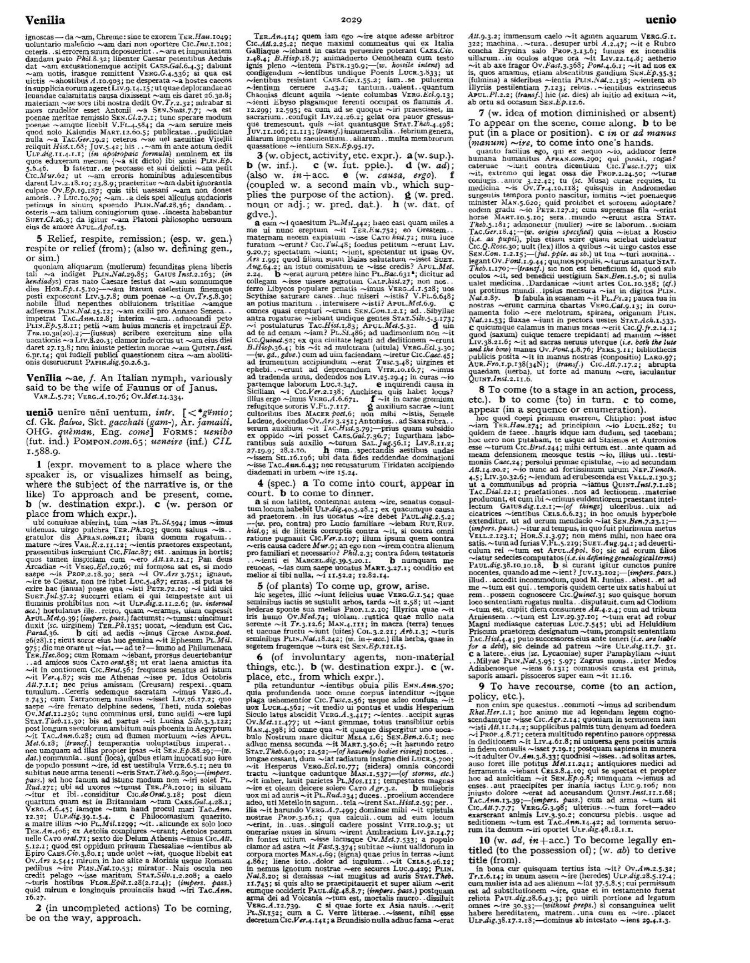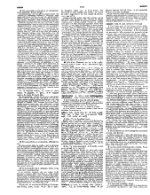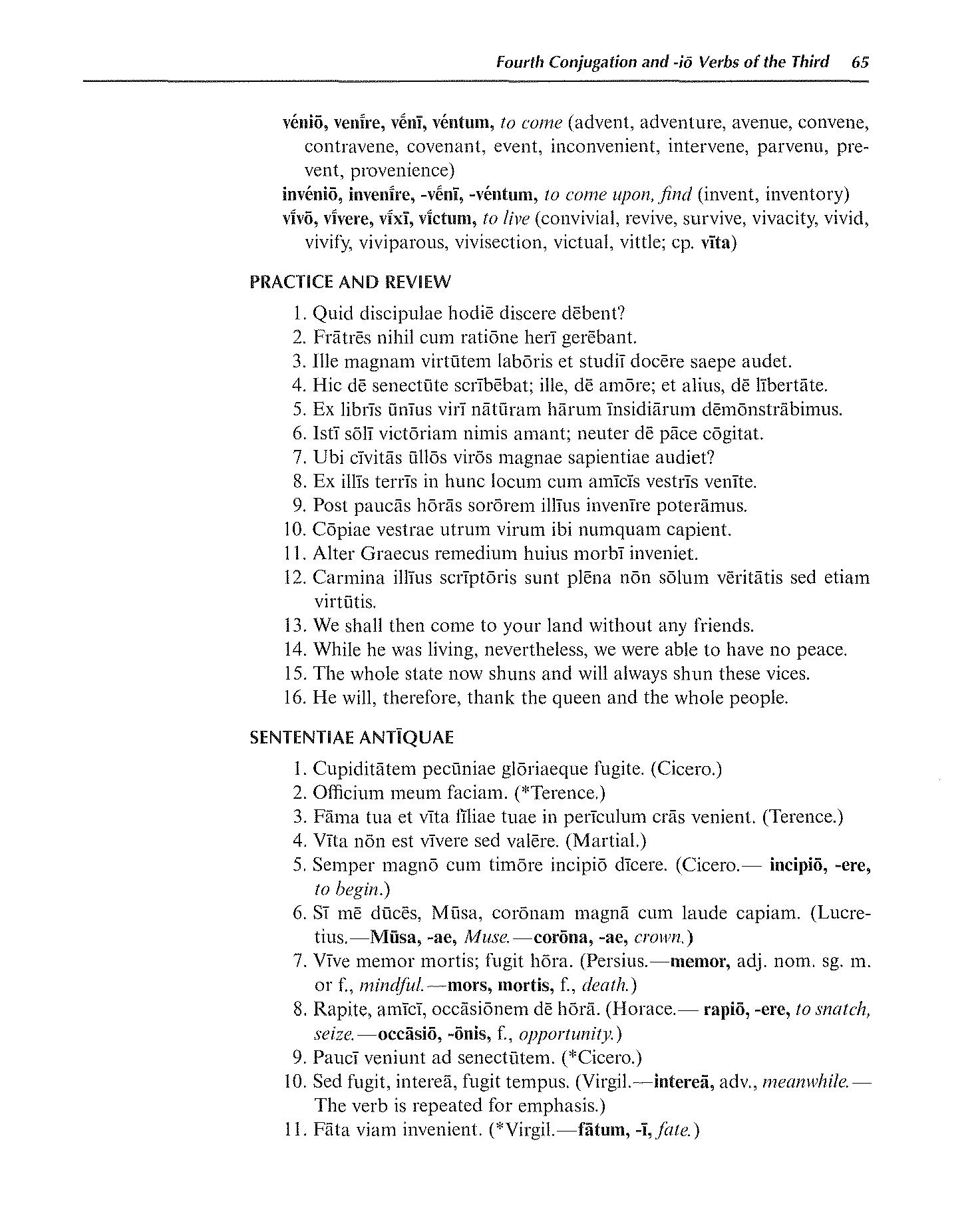
page_listing.tpl
page_subListingDetails.tpl
sub_listingDetails_style1.tpl
sub_listingDetails.title.tpl
venīre to come
venīre is a Latin Verb that primarily means to come.
Definitions for venīre
Wheelock's Latin
Verb
- 1
to come
English derivatives:
advent adventure avenue convene contravene covenant event inconvenient intervene parvenu prevent provenience
Oxford Latin Dictionary
Verb
- 1
(expr. movement to a place where the speaker is, or visualizes himself as being, where the subject of the narrative is, or the like) To approach and be present, come. (b) (w. destination expr.). (c) (w. person or place from which expr.).
- 2
(in completed actions) To be coming, be on the way, approach.
- 3
(w. object, activity, etc. expr.). (a) (w. sup.). (b) (w. inf.). (c) (w. fut. pple.). (d) (w. ad); (also w. in+acc.) (e) (w. causa, ergo). (f) (coupled w. a second main vb., which supplies the purpose of the action). (g) (w. pred. noun or adj.; w. pred. dat.). (h) (w. dat. of dgve.).
- 4
(a) To come into court, appear in court. (b) to come to dinner.
- 5
(of plants) To come up, grow. arise.
Sentences with venīre
Latin to English
Multī ex agrīs in urbem venient.Compare Many will come from the country into the city.
In urbem cum tribus ex amīcīs meīs veniēbam.Compare I used to come into the city with three of my friends.
Vir cuius fīliam amās in urbem veniēbat.Compare The man whose daughter you (love) kept coming into the city.
Crēdimus eōs ventūros esse (vēnisse, venīre).Compare We believe that they will come (came, are coming).
Parentibus placitum domum vēnērunt.Compare They came home to please their parents.
Hodiē audit (A) eōs venīre (hodiē); (B) eōs venīsse (herī); (c) eōs ventūrōs esse (mox). Compare Today he hears (A) that they are coming (today); (B) that they came (yesterday); (c) that they will come (soon).
Sed omitto oraculum; venio ad somnium.Compare But let us pass over oracles; let us come to dreams.
Convocatus ad concilium praefectus eques, venio tempus victoria demonstro.Compare The commanders of the cavalry having been summoned to a council, he shows that the time for victory has come.
Conjugation table for venīre
Cactus2000
| ACTIVE | |
| Indicative present | Indicative imperfect |
| veniō venīs venit venīmus venītis veniunt | veniēbam veniēbās veniēbat veniēbāmus veniēbātis veniēbant |
| Indicative perfect | Indicative pluperfect |
| vēnī vēnistī vēnit vēnimus vēnistis vēnērunt / vēnēre | vēneram vēnerās vēnerat vēnerāmus vēnerātis vēnerant |
| Indicative future | Indicative future perfect |
| veniam veniēs veniet veniēmus veniētis venient | vēnerō vēneris vēnerit vēnerimus vēneritis vēnerint |
| Subjunctive present | Subjunctive imperfect |
| veniam veniās veniat veniāmus veniātis veniant | venīrem venīrēs venīret venīrēmus venīrētis venīrent |
| Subjunctive perfect | Subjunctive pluperfect |
| vēnerim vēneris vēnerit vēnerimus vēneritis vēnerint | vēnissem vēnissēs vēnisset vēnissēmus vēnissētis vēnissent |
Infinitive present venīre Infinitive perfect vēnisse Infinitive future ventūrum esse | Imperative present venī venīte Imperative future venītō venītō venītōte veniuntō |
| Indicative present | Indicative imperfect |
| - - venītur - - - | - - veniēbātur - - - |
| Indicative perfect | Indicative pluperfect |
| - - ventus est - - - | - - ventus erat - - - |
| Indicative future | Indicative future perfect |
| - - veniētur - - - | - - ventus erit - - - |
| Subjunctive present | Subjunctive imperfect |
| - - veniātur - - - | - - venīrētur - - - |
| Subjunctive perfect | Subjunctive pluperfect |
| - - ventus sit - - - | - - ventus esset - - - |
Infinitive present venīrī Infinitive perfect ventum esse Infinitive future ventum īrī | Imperative present - - Imperative future - venītō - - |
| PARTICIPLE | ||
| Participle present active | ||
| Nom. | veniēns | venientēs |
| Gen. | venientis | venientium |
| Dat. | venientī | venientibus |
| Acc. | venientem | venientēs |
| Abl. | veniente | venientibus |
| Participle future active | ||
| Nom. | ventūrus | ventūrī |
| Gen. | ventūrī | ventūrōrum |
| Dat. | ventūrō | ventūrīs |
| Acc. | ventūrum | ventūrōs |
| Abl. | ventūrō | ventūrīs |
| Participle perfect passive | ||
| Nom. | ventus | ventī |
| Gen. | ventī | ventōrum |
| Dat. | ventō | ventīs |
| Acc. | ventum | ventōs |
| Abl. | ventō | ventīs |
| Gerundive | ||
| Nom. | veniendus | veniendī |
| Gen. | veniendī | veniendōrum |
| Dat. | veniendō | veniendīs |
| Acc. | veniendum | veniendōs |
| Abl. | veniendō | veniendīs |
| Gerund | Supine | |
| Nom. | venīre | ventum |
| Gen. | veniendī | ventū |
| Dat. | veniendō | |
| Acc. | veniendum | |
| Abl. | veniendō | |
Data sources
Notes
- Definitions
- Frederick M. Wheelock, Wheelock's Latin, 6th ed., rev. Richard A. LaFleur (New York, NY: HarperCollins Publishers, 2005): 65.
- P. G. W. Glare, Oxford Latin Dictionary, Vols. 1-8 (Oxford: Clarendon Press, 1982): 2029.
- Word frequencies
- Christopher Francese, "Latin Core Vocabulary," Dickinson College Commentaries, last modified 2014, http://dcc.dickinson.edu.
- Paul B. Diederich, The Frequency of Latin Words and Their Endings, PhD diss., (Columbia University, 1939).
Bibliography
Allen, Joseph H. Allen and Greenough's New Latin Grammar for Schools and Colleges: Founded on Comparative Grammar. Edited by James B. Greenough, George L. Kittredge, Albert A. Howard, and Benjamin L. D'Ooge. Boston, MA: Ginn & Company, 1903.
Crystal, David. A Dictionary of Linguistics and Phonetics. 6th ed. Oxford, UK: Blackwell Publishing, 2008.
Delatte, Louis, Suzanne Govaerts, Joseph Denooz, and Etienne Evrard. Dictionnaire fréquentiel et index inverse de la langue latine [Frequency Dictionary and Inverse Index of the Latin Language]. Liège, Belgium: Laboratoire d'analyse statistique des langues anciennes de l'Université de Liège (L.A.S.L.A.), 1981.
Diederich, Paul B. The Frequency of Latin Words and Their Endings. PhD diss., Columbia University, 1939.
Francese, Christopher. "Latin Core Vocabulary." Dickinson College Commentaries. Last modified 2014. http://dcc.dickinson.edu/latin-vocabulary-list.
Gildersleeve, Basil L., and Gonzales Lodge. Gildersleeve's Latin Grammar: Third Edition, Revised, and Enlarged. 3rd ed. London, England: Macmillan and Co., 1903.
Glare, Peter G.W. Oxford Latin Dictionary. Vols. 1-8. Oxford, England: Clarendon Press, 1982.
Krüger, Bernd. "Latin Conjugation Tables." Cactus2000. Accessed May 5, 2023. https://latin.cactus2000.de/index.en.php.
Pierson, Nick. "Sound of Text." Accessed October 26, 2019. https://soundoftext.com.
Wheelock, Frederick M. Wheelock's Latin. 6th ed. Revised by Richard A. LaFleur. New York, NY: HarperCollins Publishers, 2005.
Wiktionary Contributors. "Victionarium." Wikimedia Foundation, Inc. Updated March 18, 2019. https://la.wiktionary.org/wiki/Victionarium:Pagina_prima.
Citation
Chicago (17th ed.)
Allo Contributors. "veniō, venīre, vēnī, ventum (v.) - Latin Word Definition." Allo Latin Dictionary. Last modified . Accessed February 19, 2026. http://ancientlanguages.org/latin/dictionary/venio-venire-veni-ventum.
Entry created on . Last updated on .








